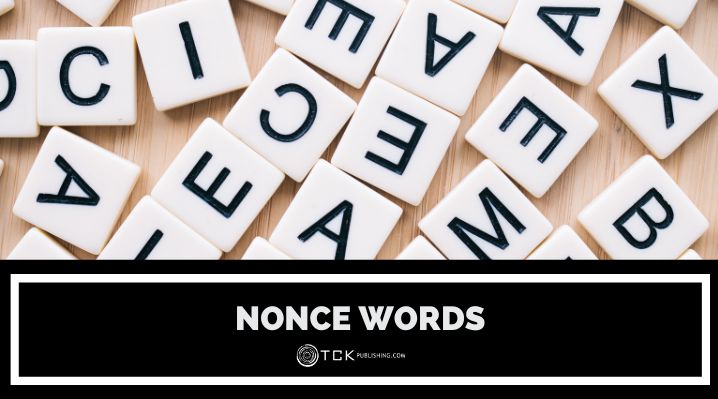
The English language contains thousands of words, each with multiple meanings to describe specific things. But what do you do when you encounter a situation that no existing word can fully capture?
Nonce Words
A nonce word, also known as occasionalism, is made when someone invents a term to describe something for which no existing word fits. The term “nonce” comes from the Middle English phrase “for the nonce,” meaning “for the time being” or “temporarily.”
Most nonce words are spontaneously made for a specific moment or use, and will likely never encountered again. However, some nonce words catch on and evolve into neologisms—newly coined terms that gain popularity and become accepted into mainstream language.
You typically infer a nonce word’s meaning through context and use. In some cases, nonce words are intentionally meaningless, often for comedic or language-testing purposes.
When you compound words together to create a makeshift term, it’s called a nonce compound. They’re usually hyphenated. For example, you might describe that groggy, half-conscious state after waking up as you being in “coffee-induced-morning-zombie-mode”.
Examples
Here are a few famous examples of nonce words:
The Jabberwocky by Lewis Carroll
’Twas brillig, and the slithy toves
Did gyre and gimble in the wabe:
All mimsy were the borogoves,
And the mome raths outgrabe.
This particular poem gave birth to two words that are now commonly used: chortle and galumph. The first is an explosive sound of amusement similar to a chuckle, while the second means to move around heavily or clumsily.
Stranger in a Strange Land by Robert Heinlein
Here, Heinlein coined the term, “grok” which means something similar to “understand,” but is more nuanced within his book. The term has made its way to computer programming, where “grok” means to not only understand something but to make it part of you.
Ulysses by James Joyce
Ulysses has plenty of invented terms. “Ringroundabout” means to completely surround something. “Poppysmic” is the sound of someone smacking their lips. “Smilesmirk” is a facial expression somewhere in the middle of a smile and a smirk. And “mrkgnao” is the sound a cat makes.
Finnegan’s Wake by James Joyce
Joyce did love to play with language. Here, he uses “bababadalgharaghtakamminarronnkonnbronntonnerronntuonnthunntrovarrhounawnskawntoohoohoordenenthurnuk” to represent a thunderclap associated with the fall of Adam and Eve.
Another famous one is “quark”, which physicist Murray Gell-Mann adopted as the name of a subatomic particle after coming across Joyce’s work.
Why Do Writers Use Nonce Words?
Plenty of writers use nonce words for different reasons. Mostly, they fill a language gap or describe something unique within their writing.
This is especially useful in fiction. Unique terms help writers build unique worlds. When given a proper name, the concepts they describe feel more concrete. Such elements give readers a more immersive experience.
Style-wise, nonce words can add humor or playfulness to your writing. Unrecognized words usually sound quirky or absurd, which can enhance the tone of a scene or a character’s dialogue. It’s quite effective in satire, where a made-up word can soften the punch of a joke by adding a touch of whimsy.
Lastly, nonce words are a way to experiment. Writers enjoy pushing the boundaries of literature, which is tied to the boundaries of language. They help challenge or play with certain conventions that affect storytelling. This often results in inventive, memorable stories that leave a lasting impact on both literature and readers.
Considerations
It’s fun to invent your own words when writing but don’t get carried away. If you flood your story with too many made-up terms, your readers will spend more time decoding them instead of engaging with your plot and characters.
Consider the length and complexity of these words too. Simple words are easier to grasp and remember, especially if they appear often in your work. If you do go for a long one, make it catchy. For example, “supercallifragilisticexpialidocious” worked in Mary Poppins because it was sung.
And of course, always think of its impact. A word’s sound can change the tone of your story. Quirky-sounding words can add humor, while more harsh-sounding ones can convey a sense of brutality. A nonce word should enhance your narrative, not distract or confuse your reader.
What do you think of nonce words? Share your thoughts below!
If you enjoyed this post, then you might also like:
- Unpaired Words: Why Do They Exist?
- What are Fossil Words? Definition and Examples
- Nominalizations: Beware of Zombie Nouns
- Deadwood Phrases: What They Are and How to Avoid Them

Cole is a blog writer and aspiring novelist. He has a degree in Communications and is an advocate of media and information literacy and responsible media practices. Aside from his interest in technology, crafts, and food, he’s also your typical science fiction and fantasy junkie, spending most of his free time reading through an ever-growing to-be-read list. It’s either that or procrastinating over actually writing his book. Wish him luck!
